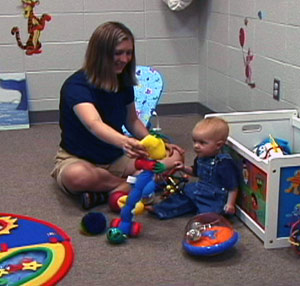We study the development of communication, cognition, and language. Over the first years, infants develop increasingly sophisticated means of communicating, from babbling to early words to language. We seek to understand the mechanisms by which communicative and cognitive development take place.
A theme of our research is the influence of the social environment on infant development.

Do you like the story?
Participants: Infants aged 10-12 1/2 months
Duration: one hour-long visit
What kind of speech do infants prefer when a caregiver reads a book to them? We set up two “rooms” in our playroom, and your infants will view a caregiver reading a book (with two different speech styles) in each room. We will see how they explore the two rooms and if they have a preference for one speech style over the other. The study session will be video-recorded.
A Parent Perception Game
Participants: Parents
Duration: one 15-minute visit
How do parents see the world when infants are nearby? To test this, we designed a video game for parents that features an infant moving around their world. Parents then make decisions about what they see in the virtual world.
Children’s Infant-Directed Speech
Participants: Families with children 3-7 years old and infants 5-12 months old
Duration: One hour-long visit
How can an older sibling influence their infant sibling’s language development? Do children act as sensitive social partners for infants just as parents do? You and your older child will play with your infant in our playroom and use a computer to respond to pre-recorded infants. Your child will also play a guessing game with an experimenter.
How do Babies Learn to Talk?
Participants: Infants aged 8-9 months
Duration: two 45-minute visits, with one or both of their parents
What features of social interaction help infants learn language? To explore this question, you and your infant will interact with different types of social partners. On the first visit, you and your infant will play together in our playroom just as you would at home. Then, on the second visit, you and your infant infant will engage in a series of interactive games. These games will allow us to investigate what types of social interactions are most helpful to infants in the process of developing language.
Adults’ Responses to Prelinguistic Infants
Participants: Fathers of infants aged 8 1/2 to 9 1/2 months
Duration: One 30-minute visit
Is baby babbling communicative? Do different forms of infant babbling change the behavior of their parents? In what contexts do infant vocalizations elicit stronger reactions from parents? In this study, fathers will use a computer to respond to prerecorded examples of infant behavior.